



Mahendra Kumar Thapar, a first-generation refugee, shifted to Mumbai when he was three years old. Thapar, now 78, says his family left behind a comfortable life wherein they owned acres of land and several houses in Hazara district of Pakistan and shifted to India becoming a refugee during the partition. Thapar, along with his family, were among thousands of other Punjabis and Sindhis who chose to move to the Indian side during the partition following India’s independence in August 1947.
Thapar, like others, was allotted a house of around 40 square yard (360 sq ft) in Central Mumbai's Sion Koliwada area also known as Guru Tegh Bahadur Nagar or Punjabi Colony. Beginning 1957, the government settled over 1,200 refugee families in around 1,200 apartments spread over 25 buildings that were constructed specially for the refugees.
The cost of one apartment at that time was around Rs 5,380, at a per sq ft rate of around Rs 14-15. Today, the per sq ft rate in the locality ranges between Rs 20,000 and Rs 30,000. The refugees were given the option by the government to pay the amount in instalments, which made the purchase practical for them.
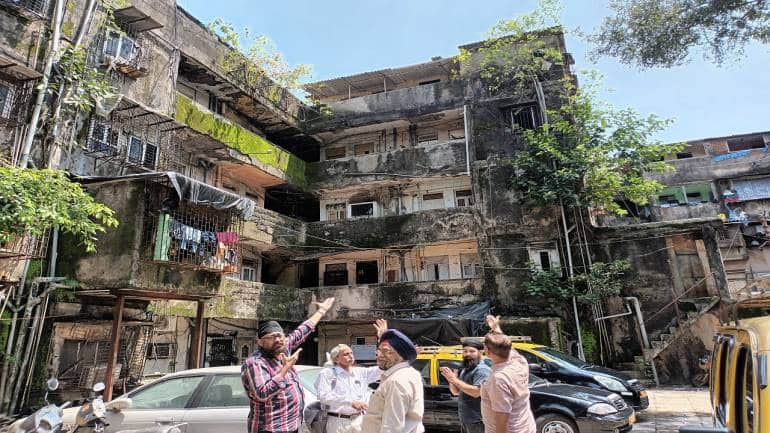 First, second and third refugees pointing out towards the dilapidated structures of GTB Nagar refugee colony. (Photo: Mehul R Thakkar)
First, second and third refugees pointing out towards the dilapidated structures of GTB Nagar refugee colony. (Photo: Mehul R Thakkar)However, the current value of their apartments remains only on paper as all the 25 buildings have been declared dilapidated by Mumbai’s civic body, Brihanmumbai Municipal Corporation (BMC), and the apartments have been vacated.
 A notice in Marathi stuck outside the dilapidated buildings of refugees asking public to stay away from the buildings. (Photo credits: Mehul R Thakkar)History
A notice in Marathi stuck outside the dilapidated buildings of refugees asking public to stay away from the buildings. (Photo credits: Mehul R Thakkar)HistoryThe Central government had decided to rehabilitate several thousand Hindu Punjabis, Sikh Punjabis and Sindhi refugees who had crossed the border and entered India following partition. In Maharashtra, more than 30 colonies were constructed, including in Mumbai then known as Bombay.
These refugees, who were mostly from Pakistan's Sindh and Punjab province, were given homes under the Displaced Persons (Compensation and Rehabilitation) Act, 1954.
In Mumbai, more than 5,000 families were given homes in five colonies, namely Sion Koliwada, Wadia Trust Estate in Kurla, Chembur Colony in Chembur, Thakkar Bappa Colony in Chembur, and Mulund Colony in Mulund.
Of these, Moneycontrol visited the cluster of Sion Koliwada in GTB Nagar spread across more than 11 acres.
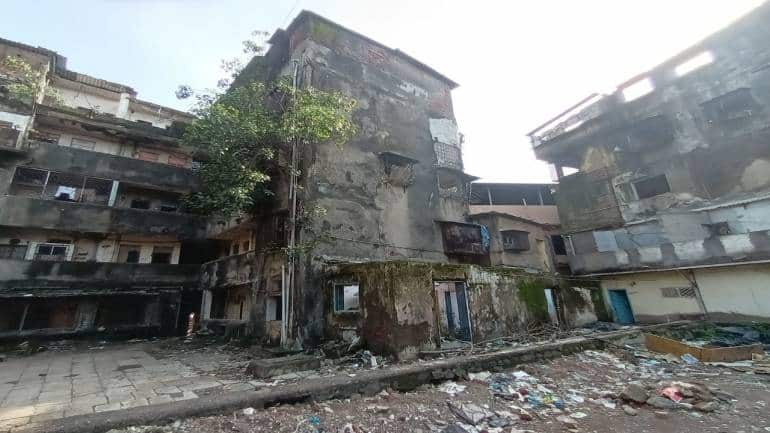 The refugee colony in GTB Nagar at Mumbai has 25 buildings that are currently in a very bad condition. (Photo credits: Mehul R Thakkar)
The refugee colony in GTB Nagar at Mumbai has 25 buildings that are currently in a very bad condition. (Photo credits: Mehul R Thakkar)Traditionally, the Punjabis and Sindhis are business class communities. Many had set up shop outside their homes. However, after 10 years, those who made it good in life, shifted out of the 'refugee' colony, selling their apartment to other refugees, and in a few cases, to non-refugees.
During this time, several refugees from other states and cities of India also shifted to the GTB Nagar refugee colony.
According to second- and third-generation refugees, this also resulted in the demographics of the GTB Nagar refugee camp changing, as financially sound Punjabis and Sindhis sold their apartments and moved on to other areas in the city.
Many also shifted abroad. Some however, continued to stay back in the refugee colony in the hope of redevelopment of their building. Around 40 years following partition, in the late 1990s, residents of GTB Nagar started receiving notices from the authorities to vacate their buildings as they had become dilapidated.
However, the residents did not move from the buildings, resulting in the BMC trying to undertake demolition. But the residents protested and the BMC had to turn back. Further, the Bombay High Court and the Supreme Court restrained the BMC from going ahead with the demolition of the 25 buildings in 2018 and 2019, respectively.
In 2020, the BMC started disconnecting water and electricity supply to these buildings, resulting in the residents moving the Bombay High Court. The court asked the BMC to restore water and electricity supply, but hundreds of families had started making the move amid the pandemic-induced lockdown nationwide.
Earlier, in April 2018, the Maharashtra government announced its decision to make freehold the land given to Sindhi and Punjabi refugees who had migrated from Pakistan. This meant the refugees could sell their houses/apartments or opt for redevelopment without any interference from the state government, who were the owners of these properties.
History from historians’ point of viewBharat Gothoskar, Founder, KHAKI Heritage Foundation, said, "Till about a 100 years ago, the areas north of the industrial belt of Parel-Lalbaug in Mumbai were primarily agricultural, with villages like Sewri, Wadala, Matunga, etc. In addition to the villages, there were smaller hamlets that housed different communities. For example, Matunga had a Maharwada, Sion had an Agarwada and a Koliwada housed two communities that lived off the sea and the marshes between Sion and Trombay — the Agris who made salt and the Kolis who went out to fish."
Gothoskar added, "After the plague of 1896, the Bombay Improvement Trust took over all these lands to transform them into garden suburbs. While the Dadar-Matunga area was developed first, the other schemes of the Trust in the area did not take off immediately. And then, when World War II started, the open lands in the city from Colaba to Kalyan were used to build barracks for soldiers."
He further added, "After partition, these barracks came in handy to resettle refugees from Punjab and Sindhi in different parts of Maharashtra. A majority of Punjabi and Sikh refugees were resettled in the Sion Koliwada area, and that's how it became a predominant Punjabi settlement in the city. It was even renamed Guru Tegh Bahadur Nagar. The original barracks built in the Sion Koliwada area on salt pan land were later turned into buildings for refugees. However, now there is a need for redevelopment of the area, keeping the Punjabi and Sikh heritage of the area in mind as well as its refugee history."
Status todayAs second- and third-generation refugees and non-refugees started moving out of their homes in 2020 or even before that, the 25 buildings became empty. Today, there is hardly anyone residing in these dilapidated structures. Some of the apartment owners have rented out these apartments at very low rental value. In some cases, trespassers have moved into some apartments, claim the refugees to whom Moneycontrol spoke.
However, officially, the BMC has pasted a public/caution notice outside every building that the structure is in a dilapidated condition and that no one should enter the building or use it for habitation. The demolition of building No 20 out of the total 25 buildings was taken up in the last week of July 2022 as the structure had become dangerous for the surrounding roads.
A third-generation refugee, not wishing to be named, said, "We have rented out our apartment, and are getting monthly rent of Rs 4,000. The portion in which our apartment is located is relatively safe, as we had carried out repair work. However, partially the building is in a bad state. But we do not have any option, we are staying at Navi Mumbai in a rented apartment where we are paying a monthly rental of Rs 35,000 for a 3BHK. We still have to make up for the difference of around Rs 30,000."
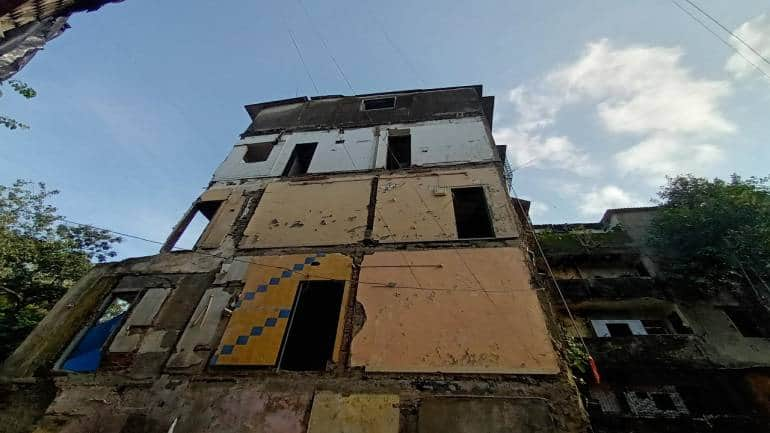 Several residents of the refugee camps had also made alterations to the original structure of the buildings. (Photo Credits: Mehul R Thakkar)Hopes of redevelopment
Several residents of the refugee camps had also made alterations to the original structure of the buildings. (Photo Credits: Mehul R Thakkar)Hopes of redevelopment Sunil Vijan, 58, a second-generation refugee at the GTB Nagar camp, said, "The problems are several but the solution for all is only one — redevelopment of the colony. The problems range from eligibility, considering several refugees have sold their apartments to other refugees or even to non-refugees, but these deals were not registered. Some are getting it registered but many are being asked to pay a penalty, which is making things difficult."
Vijan added, " Also, many do not have refugee cards. There are a large number of non-refugees who own these apartments now. There is also a lack of unity among the original refugees. Some want a private developer to come in, while others want the Maharashtra Housing and Area Development Authority (MHADA) to come forward and do the redevelopment. MHADA has shown active interest in the redevelopment of the colony and things are moving at a good pace."
He added, "We are thankful to the government and everybody in power, but our appeal is to take active interest and ensure that our homes are redeveloped. Today, our homes have zero value, and on top of this we are paying Rs 20,000 monthly rent to stay in a rented apartment despite having a house of our own."
Several refugees and residents say the state government should open a single window clearance to solve all the problems relating to stamp duty and papers relating to the documents for proving ownership of the apartments.
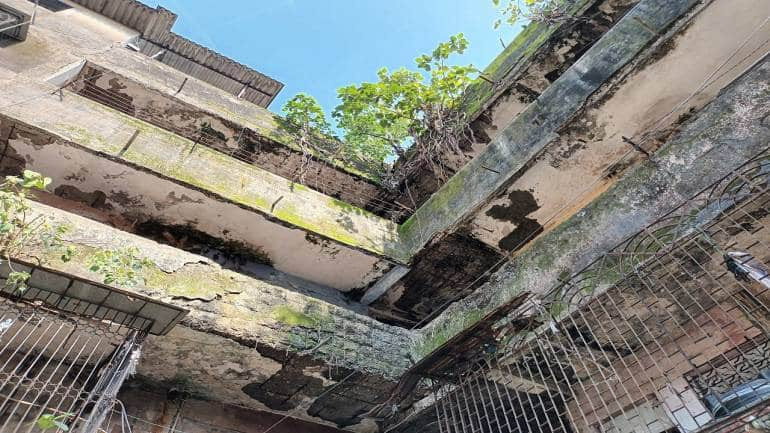 All the 25 buildings have been vacated by the refugees and their families by June 2020 amid the Covid-19 pandemic. (Photo credits: Mehul R Thakkar)
All the 25 buildings have been vacated by the refugees and their families by June 2020 amid the Covid-19 pandemic. (Photo credits: Mehul R Thakkar)Said 54-year-old Bunty Sehgal who has a shop and house in building No. 4 of the colony, "We need the state government to put in place a single window clearance to sort out all the problems of the tenants. Also, at the same time, all those who own an apartment have to stay united and make a firm decision. More than 20 private developers have come and gone without giving any concrete reason because one of the reasons for this is lack of unity among the residents of the 'refugee' colony."
Sehgal added, " At the same time, I agree it was our fault too because in all these years our fathers and grandfathers did not pay much attention to repair works. There were haphazard extensions and alterations to the structures. If these aspects were looked after well, probably we would not have been staying here today. Who likes to stay in a rented apartment paying Rs 40,000 per month for a 2-BHK? On top of this, every resident residing here has a bank account in PMC Bank where our money is stuck."
PMC Bank was shut in 2019 following detection of certain financial irregularities, hiding and misreporting of loans given to a real estate developer.
Another third-generation refugee, 30-year-old Simranjeet Singh, from GTB Nagar 'refugee' colony, said, "I have grown up listening to the discussion of redevelopment of our colony but nothing is working out. We have hopes from the redevelopment considering we are a family of six people and currently have to pay rent of Rs 35,000 for residing in a rented apartment."
Singh added, "We also have a shop in the colony, since there is nowhere else to go. In 2016, there was demonetisation, 2017 there was GST regime, 2019 PMC Bank was shut down, and in 2020 came COVID-19. Later, we all had to shift out."
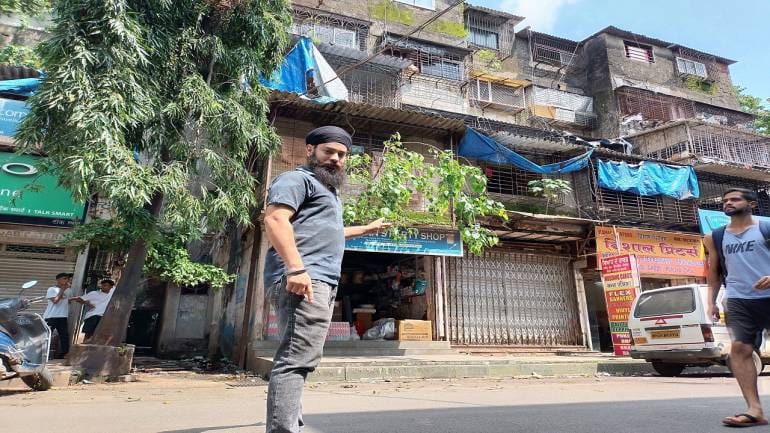 Simranjeet Singh outside his shop in GTB Nagar refugee camp, (Photo credits: Mehul R Thakkar)
Simranjeet Singh outside his shop in GTB Nagar refugee camp, (Photo credits: Mehul R Thakkar)Singh added, "The expenses have only increased. Additionally, more than Rs 8 lakh of our money has got stuck in PMC Bank. For now, we are only requesting the government to look into this matter of redevelopment to safeguard our current and future generations. We feel left out as Indians even after serving the nation in every way possible."
Slum-dwellers get rehabilitated in Mumbai, why not us?Retired banker 66-year-old Manmohan Singh, said his children and grandchildren are studying in nearby schools and colleges, and are currently paying heavy rent after selling their belongings to survive. The financial condition of the people is very bad, especially senior citizens suffering from health problems.
Both Singh and Thapar wondered if even slum dwellers in Mumbai can be given a flat after redevelopment, why can’t they get one.
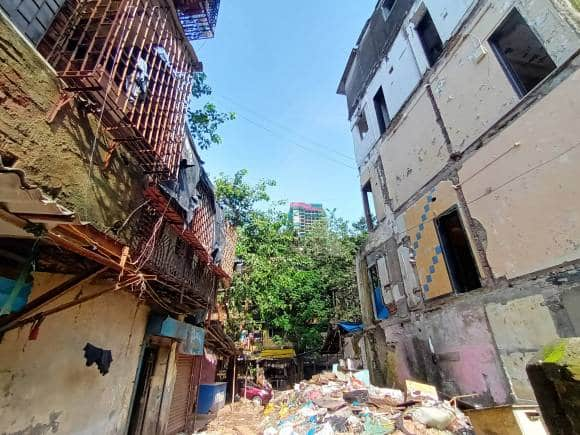 (Photo credits: Mehul R Thakkar)
(Photo credits: Mehul R Thakkar)Thapar said, "We are thankful to the government that they accommodated us during partition. But it is our appeal that they look at our problems today. From among the second-, third- and fourth-generation of refugees, not all are wealthy and well to do."
He added, "Our fear is what if some people take extreme steps due to lack of money and a roof over their heads? Despite this, the seven gurdwaras and temples in our area ensure that everyone in the area gets food and no one sleeps hungry. I have written to the Prime Minister, and various Chief Ministers of Maharashtra to help solve our problems. We are hoping for a solution soon."
Discover the latest Business News, Sensex, and Nifty updates. Obtain Personal Finance insights, tax queries, and expert opinions on Moneycontrol or download the Moneycontrol App to stay updated!
Find the best of Al News in one place, specially curated for you every weekend.
Stay on top of the latest tech trends and biggest startup news.